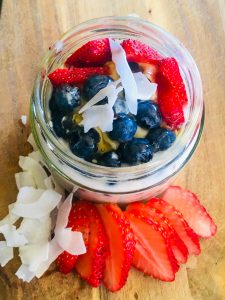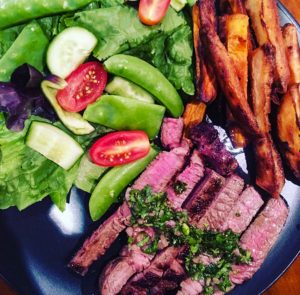In my last post I chatted about how I approach constipation in my littlest patients. It’s usually a combination of specific probiotics and prebiotics, alongside gentle, non-habit forming laxatives, all the while addressing any underlying causes.
Today I’ll share some ways you can support the process from home.
1. Using food to get things moving
When it comes to fibre we often think of scratchy cereals and bran, yet for many these can exacerbate gut problems. However there are plenty more high fiber, nutrient-dense foods that can help when included, especially when eaten most days of the week.
- Kiwifruit
- Blackberries
- Leafy green vegetables
- Beetroot
- Raw carrot (ideally grated)
- Oat Bran and oats (if tolerated)
- Ground flaxseed (at 1-2 tsp per day)
I often suggest flaxseed tea as well, especially for those who wont do the “bittyness”of flaxseeds. Pour 1 cup of boiled water over a tablespoon of flaxseeds and allow to cool completely before straining. This can then be drunk as a tea, or used as the base of a smoothie or for mixing in any supplements etc.

2. Creating Hydration Heros
At times even I underestimate how much of a difference drinking enough water can make to healthy bowel function; it has even been the main driver for a few of my clients. Talk to your child about the importance of drinking enough water throughout the day and for little ones how it can help them become a “Hydration Hero”. Make sure they have access to fresh water throughout the day (investing in a good water bottle can help) and provide them with gentle reminders to sip from it.
To get an idea of how much your child should be drinking aim for 30ml of water per kilogram of body weight per day. An extra glass or two may be needed if they sweat a lot as they play or exercise. Certain foods have a higher water content, and the style of meals we eat (soups, broths, smoothies etc) will also contribute to hydration, so this is not to be a rigid rule but to help you get a benchmark for what is appropriate for your child.
3. Move that Body!
We know sitting around often slows our bowels and that movement can really help improve peristalsis; i.e., motility of the bowel. Just getting your child up and about can help accelerate the transit time of their bowel. Encourage them to play outside, swim, jump, hop on their bike or scooter or just head to the park for a good run around.
4. Tummy Massages for Movement
When things have slowed for awhile, or your child is uncomfortable, abdominal massage can sometimes help get things moving. I suggest to massage their tummy in a clockwise direction on a daily basis, ideally when they’re relaxed and happy to lie with you. It shouldn’t be uncomfortable for your child and you don’t need to apply a huge amount of pressure. You can use a plain moisturising cream or base oil (such as coconut oil) to massage with.
This can also been seen as a lovely moment to stop and fully connect with your child. I’ve had parents comment that after awhile their child started to voluntarily open up more about their day and how they were feeling. In the busyness of daily life, these daily tummy massage sessions offered their child a quiet moment (with their parents full attention) to talk and share more.
5. Developing Daily Habits to Retrain the Bowel
When constipation becomes quite chronic, your child may no longer feel the urge to move their bowels. This is where retraining the bowel is important. Have them on the toilet at the same time each morning to help reset signaling.
It’s also very important to talk to your child about listening to their body about when they need to go and that holding on because they are “too busy” or don’t want to stop playing isn’t good for them.
Hopefully these tips help you in supporting your child to develop healthy bowel habits and minimise constipation. Don’t forget it is also essential to rule out any underlying causes of your child’s constipation and my previous blog on this topic may be helpful to you.
Share the love

About Sandi
Sandi Cooper is an experienced Naturopath working in clinical practice for almost two decades. Her clients love her down-to-earth approach and her naturally caring qualities. Although Sandi is experienced in most areas of clinical practice, she has a special interest in children’s health and nutrition, working with parents to get the best outcomes for their children.




